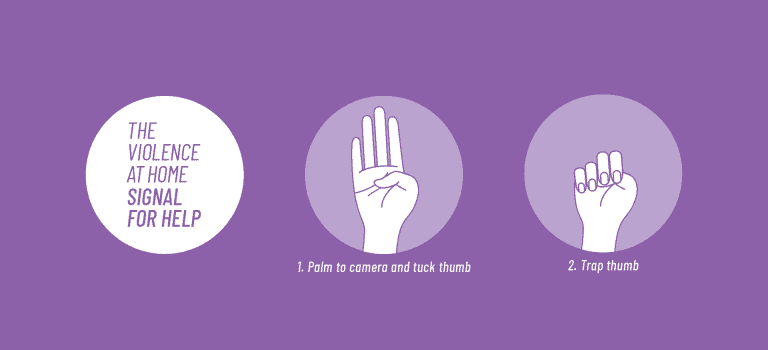If you are considering divorce after your partner has been physically, sexually, or emotionally abusive,…
If you are a victim of domestic violence, you aren't alone — this is a public health crisis that affects an estimated 10 million people every year.
- 1 in 4 women are victims of domestic violence
- 1 in 9 men are victims of domestic violence
If you are experiencing physical violence or a credible threat of harm or injury, you need to get help. However, calling 911 or shouting for assistance isn't always an option and can escalate an already dangerous situation. If you're experiencing domestic violence distress and need immediate assistance, consider these signals to show others you need help.
Distress Signals for Domestic Violence
First, we wanted to share the two most commonly used domestic violence distress signals.
Signal for Help Hand Gesture
A young woman in Kentucky was able to escape kidnapping by alerting drivers around her of her situation. The "signal for help" gesture is where your hand is raised with your thumb tucked against your palm (like you're showing the number 4), then close your fingers over your thumb. A driver on the interstate recognized the signal and alerted the authorities.
Created by The Canadian Women's Foundation, the Signal for Help was meant for people during the pandemic who were trapped inside with their abuser. The campaign went viral on TikTok and other social media platforms and has brought assistance to thousands of people in North America.
Black Dot Signal
Several years ago, the "black dot campaign" was founded and swept across social media. The idea is to place a small black dot on your hand and show it to someone who may be able to provide assistance.
Are Distress Signals Effective?
While some victims of abuse have used these signals to get help or to alert someone they are in danger, they are not foolproof. In fact, because these are viral campaigns, people who aren't on social media may not be aware of them or what they mean. Another concern is that if the general public is aware of these distress signals, an abuser may be aware too, drawing additional risk or danger.
There aren't proven statistics that either of these distress signals are effective at getting assistance.
Safety Planning While Living with Domestic Violence
If your partner is physically or sexually violent and you are planning to leave your abusive relationship, it's important to keep yourself safe in the meantime with these steps:
- Assess your partner's use or threat of force so you can determine the risk and de-escalate if possible
- Identify where you can go in your home before force occurs, choosing rooms with an exit (window or door) without weapons
- Keep your phone on you at all times so you can call for help
- Come up with plausible reasons for leaving the house or being away from the house, such as staying late at work, a trip to the grocery store, or going to the post office
- Try to ensure guns and knives are locked up and not easily accessible
Talk to an Attorney About Getting a Protective Order Today
If you are in an abusive relationship, you need to protect yourself and put a plan in place to leave. Our family law firm can help you get started by filing a restraining order on your behalf and representing you at the hearing. In addition to restraining orders, we can also represent you in other matters of family law, including divorce, child support, and child custody.
Our aggressive divorce lawyers are dedicated to helping domestic violence victims achieve favorable outcomes in a divorce or separation. We'll stand up for your rights, advocate for your family, and fight to get you a fair settlement. To learn more about how we can help you or to schedule a consultation, call (919) 301-8843 or complete the form below, and a member of our team will contact you shortly.





